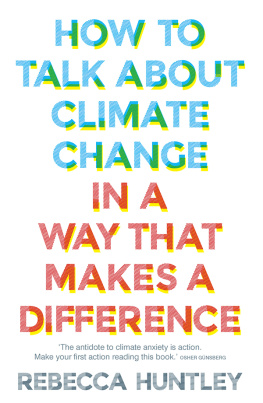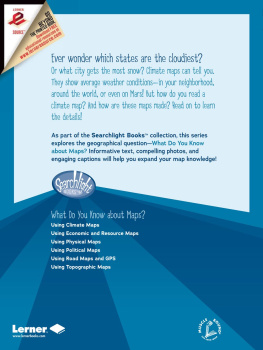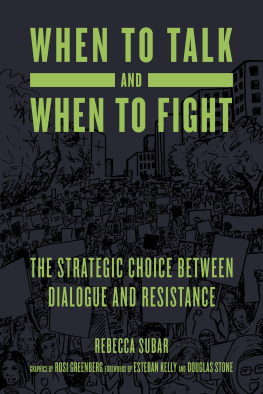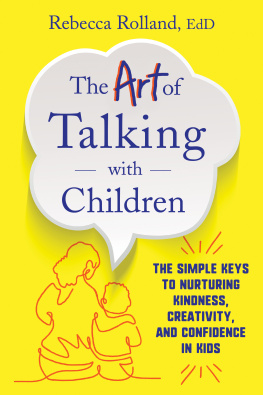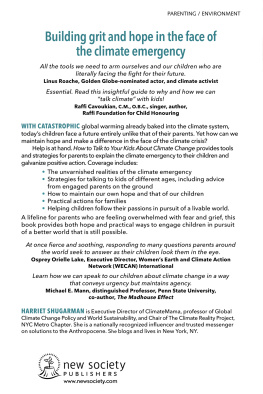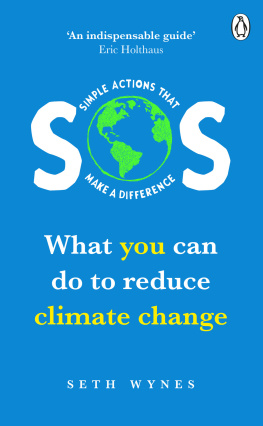Rebecca Huntley - How to Talk About Climate Change in a Way That Makes a Difference
Here you can read online Rebecca Huntley - How to Talk About Climate Change in a Way That Makes a Difference full text of the book (entire story) in english for free. Download pdf and epub, get meaning, cover and reviews about this ebook. year: 2020, publisher: Allen & Unwin, genre: Home and family. Description of the work, (preface) as well as reviews are available. Best literature library LitArk.com created for fans of good reading and offers a wide selection of genres:
Romance novel
Science fiction
Adventure
Detective
Science
History
Home and family
Prose
Art
Politics
Computer
Non-fiction
Religion
Business
Children
Humor
Choose a favorite category and find really read worthwhile books. Enjoy immersion in the world of imagination, feel the emotions of the characters or learn something new for yourself, make an fascinating discovery.
- Book:How to Talk About Climate Change in a Way That Makes a Difference
- Author:
- Publisher:Allen & Unwin
- Genre:
- Year:2020
- Rating:4 / 5
- Favourites:Add to favourites
- Your mark:
- 80
- 1
- 2
- 3
- 4
- 5
How to Talk About Climate Change in a Way That Makes a Difference: summary, description and annotation
We offer to read an annotation, description, summary or preface (depends on what the author of the book "How to Talk About Climate Change in a Way That Makes a Difference" wrote himself). If you haven't found the necessary information about the book — write in the comments, we will try to find it.
How to Talk About Climate Change in a Way That Makes a Difference — read online for free the complete book (whole text) full work
Below is the text of the book, divided by pages. System saving the place of the last page read, allows you to conveniently read the book "How to Talk About Climate Change in a Way That Makes a Difference" online for free, without having to search again every time where you left off. Put a bookmark, and you can go to the page where you finished reading at any time.
Font size:
Interval:
Bookmark:

I am indebted to Per Espen Stoknes and George Marshall, whose work in the area of climate change communication has been so influential and guided me through the process of writing this book.
A special shout-out to Linh Do for connecting me with so many great climate communicators around the globe.
Thanks to Grant McDowell, Akufuna Muyunda, Ken Berlin, Stacie Paxton Cobos and Dan Kanninen for making time to talk and share their ideas with me.
Thanks to friends and colleagues who supported me through this process: Felicity Wade, Lyndon Schneiders, Damian Ogden, James Bradley, Owen Wareham and the great people at WWF, Blanche Verlie, Kelly Doust, Cecilia Anthony, Louise Wagner, Moksha Watts, Linda Scott, Deanne Head, Amy Stockwell, Sarah Macdonald, Carmen Lawrence and Eloise Spitzer. Thanks to the patience and understanding of my peers at work (Pino, Josh and Rea in particular). Thanks also to the Climate Reality teams, in both Australia and the United States. Thanks to the great people at the Yale Program, especially Lisa Fernandez, Anthony Leiserowitz, Parrish Bergquist, Seth Rosenthal and Matt Goldberg. Thanks also to Professor Carol Johnson and Professor Martha Augoustinos at Adelaide University.
Thanks to Isabella Bowdler for outstanding research assistance.
As always, my spectacular agent, Jeanne Ryckmans from Camerons Management, cared about this project well beyond the confirmation of the publishers contract.
The passion and dedication of the Murdoch Books team was second to none: Lou Johnson, Julie Mazur Tribe, Carol Warwick, Nicola Young and last but definitely not least Jane Morrow.
Thanks also to Daniel Yarrow and the extended Bowen and Yarrow clan for distracting the children while I wrote. And my mum and Graham for letting me move back home from time to time to write as well.
Introduction: A change of heart
>
>
Per Espen Stoknes, What We Think About When We Try Not to Think About Global Warming: Toward a new psychology of climate action, White River Junction, Vermont: Chelsea Green Publishing, 2015, p. 132
Stoknes, What We Think About, p. 133
Stoknes, What We Think About, p. 133
Thunberg, The disarming case to act
Chapter 1: The problem with reason
Edward O. Wilson, Half-Earth: Our planets fight for life, New York: W.W. Norton & Co., 2016, p. 1
Stoknes, What We Think About, p. 3839; authors italics
Stoknes, What We Think About, p. 81
Stoknes, What We Think About, p. 81
Nathaniel Rich, Losing Earth: The decade we could have stopped climate change, New York: Picador, 2019, pp. 180, 200
Rich, Losing Earth, p. 5
George Marshall, Dont Even Think About It: Why our brains are wired to ignore climate change, London: Bloomsbury, 2014, p. 121
Chapter 2: Start being emotional
>
>
Rich, Losing Earth, p. 5
Rich, Losing Earth, p. 42
Rich, Losing Earth, pp. 412
Rich, Losing Earth, p. 45
Mike Hulme, Why We Disagree About Climate Change: Understanding controversy, inaction and opportunity, Cambridge: Cambridge University Press, 2009, p. 364
Anthony A. Leiserowitz, American risk perceptions: is climate change dangerous?,Risk Analysis, 2005, vol. 25, no. 6, pp. 143342
Lorraine Whitmarsh, Scepticism and uncertainty about climate change: dimensions, determinants and change over time, Global Environmental Change, 2011, vol. 21, no. 2, pp. 690700
Bruce Tranter, Its only natural: conservatives and climate change in Australia,Environmental Sociology, 2017, vol. 3, no. 3, pp. 27485
>
>
>
Chapter 3: Green girls
See Danielle F. Lawson et al., Children can foster climate change concern among their parents, Nature Climate Change, 2019, vol. 9, pp. 45862
Lawson et al., Children can foster climate change concern, p. 459
Lawson et al., Children can foster climate change concern, p. 460; my italics
Lawson et al., Children can foster climate change concern, p. 460
See Sifan Hu & Jin Chen, Place-based inter-generational communication on local climate improves adolescents perceptions and willingness to mitigate climate change,Climatic Change, 2016, vol. 138, pp. 42538
Hu & Chen, Place-based inter-generational communication, p. 428
Hu & Chen, Place-based inter-generational communication, p. 425
Hu & Chen, Place-based inter-generational communication, p. 436
Marshall, Dont Even Think About It, p. 187
Marshall, Dont Even Think About It, p. 191
>) for a discussion of this research
Marshall, Dont Even Think About It, p. 189
Marshall, Dont Even Think About It, p. 190
>
>
Wilkinson, How empowering women and girls.
Wilkinson, How empowering women and girls.
Daniel A. Chapman, Brian Lickel & Ezra M. Markowitz, Reassessing emotion in climate change communication, Nature Climate Change, 2017, vol. 7, pp. 8502
Chapter 4: Guilt
>
Glicksman, Your brain on guilt and shame. The author of this article refers to work done by researchers at the Ludwig Maximilian University in Munich
Stoknes, What We Think About, p. 60
Stoknes, What We Think About, p. 5
See Stokes et al., Global concern about climate change
Marshall, Dont Even Think About It, p. 193
Jonas H. Rees, Sabine Klug & Sebastian Bamberg, Guilty conscience: motivating pro-environmental behaviour by inducing negative moral emotions, Climatic Change, 2015, vol. 130, pp. 43952
>
Hang Lu & Jonathon P. Schuldt, Compassion for climate change victims and support for mitigation policy, Journal of Environmental Psychology, 2016, vol. 45, pp. 192200
Schneider et al., The influence of anticipated pride and guilt
>
>
Lu & Schuldt, Compassion for climate change victims, p. 194
Lu & Schuldt, Compassion for climate change victims, p. 192
Lu & Schuldt, Compassion for climate change victims, p. 197
Chapter 5: Fear
David Wallace-Wells, The Uninhabitable Earth: A story of the future, New York: Penguin Press, 2019, p. 3
>
Stoknes, What We Think About, p. 31
Hulme, Why We Disagree About Climate Change, p. 14
Hulme, Why We Disagree About Climate Change, p. 13
Hulme, Why We Disagree About Climate Change, p. 2
Stoknes, What We Think About, pp. 456
Stoknes, What We Think About, p. 40
Rich, Losing Earth, p. 40
Rich, Losing Earth, p. 112
Stoknes, What We Think About, p. 27
Stoknes, What We Think About, p. 44
See Allan Mazur, True Warnings and False Alarms: Evaluating fears about the health risks of technology, London: Routledge, 2004
Stoknes, What We Think About, p. 45
Stoknes, What We Think About, p. 44
Brigitte Nerlich & Rusi Jaspal, Images of extreme weather: symbolising human responses to climate change, Science as Culture, 2014, vol. 23, no. 2, pp. 25376
Lisa Zaval et al., How warm days increase belief in global warming, Nature Climate Change, 2014, vol. 4, pp. 1437
See Allan Mazur, Global warming in the fickle news, Social Science and Public Policy, 2019, vol. 56, pp. 61319
>
Bergquist & Warshaw, Does global warming increase public concern?, p. 2
Bergquist & Warshaw, Does global warming increase public concern?, p. 2
Rich, Losing Earth, p. 208
Saffron ONeill & Sophie Nicholson-Cole, Fear wont do it: promoting positive engagement with climate change through visual and iconic representations,
Next pageFont size:
Interval:
Bookmark:
Similar books «How to Talk About Climate Change in a Way That Makes a Difference»
Look at similar books to How to Talk About Climate Change in a Way That Makes a Difference. We have selected literature similar in name and meaning in the hope of providing readers with more options to find new, interesting, not yet read works.
Discussion, reviews of the book How to Talk About Climate Change in a Way That Makes a Difference and just readers' own opinions. Leave your comments, write what you think about the work, its meaning or the main characters. Specify what exactly you liked and what you didn't like, and why you think so.

